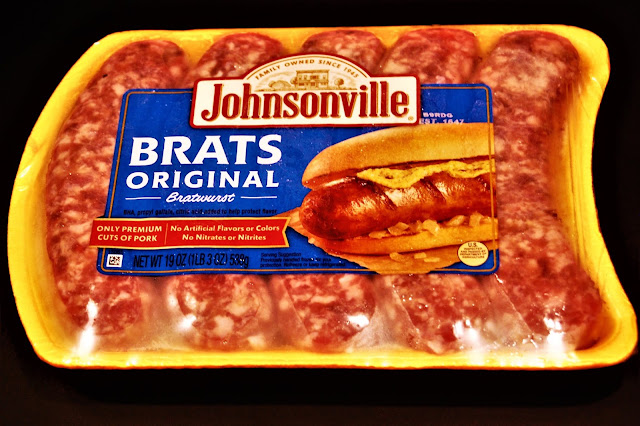Many of my friends
behind the Cheddar Curtain live on three basic food groups: beer, brats and
cheese. No wonder so many Wisconsinites have heart attacks. They may not live
healthy lifestyles, but they enjoy life to the fullest drinking beer, eating
brats and cheese curds and cheering on the Packers and Brewers.
Below is one
popular recipe, made the way many Wisconsinites make their brats. If you want
to cook like a Wisconsin native, be sure to put Johnsonville brats on your shopping
list. These are the favorites of BBQ enthusiasts in many parts of the country.
If you want great
results, start with the best ingredients, such as Johnsonville Brats, made in
Sheboygan, WI.
Before braising or
roasting beer brats, make sure that the brats have completely defrosted if they
have been frozen. Cooking frozen brats can result in the sausages bursting.
CAUTION: Under No
Circumstances Should You Pierce the Brats. This
is a genuine Bozo-No-No, which only allows the juices and the flavor to seep
out of the brats, as well as drying out the meat.
Marinade the brats
in beer or chicken broth (shown below) in your refrigerator for at least two
hours, making sure that the liquid covers the sausages. When you are ready to
cook your sausages, remove them from the fridge and allow them to come to room
temperature, before simmering them.
After marinading
the brats in beer for two hours in your refrigerator, simmer them on low heat for 10 to 15 minutes.
The liquid should completely cover the sausages. if one bottle doesn’t cover
the brats, add another one.
On your stove top,
simmer the brats on low heat for 10 to 15 minutes. Before placing the brats on the grill, dust
them with your favorite BBQ rub.
At the same time
that the brats are simmering, sauté slices of onion and pepper (you can use a
variety of your favorite peppers) in butter and olive oil until the onion is
transparent and begin to caramelize. My selection included a relatively mild
assortment: green peppers, orange peppers, cubanelle peppers, banana peppers
and Jalapeño
peppers.
After the onions became translucent, I
added a couple of cloves of minced garlic and a variety of peppers. If you
don’t know your peppers, ask your grocer to help you in your selection.
Arrange the coals
on one side of your grill for indirect cooking. Clean the grill grate, while it
is cool, with a maroon painter’s ScotchBrite pad. Then coat the surface of the
grate with olive oil or a non-stick cooking spray to prevent the brats from
sticking.
Place the brats around
the edges of the grill so you are cooking indirectly, as shown in the picture
below. The charcoal should be flaming red. Do not cook directly over the coals,
which invariably causes the brats to burst as well as often resulting in flare
ups.
If you are cooking
at a grill temperature of 375º – 400º F, the brats should brown in about 10 to
15 minutes. Turn the brats regularly on
the grill so they brown uniformly on all sides. Browning caramelizes the meat
adding to the flavor of the brats.
The internal
temperature of the meat should be 145º F. This is contrary to the
recommendations from the FDA and USDA. The problem is that if you BBQ the brats
to the suggested internal temperature of 160º – 165º F, the meat will be dried
out.
After
the brats are cooked, you can arrange them for your guests over the sauteed
onions and peppers. See the picture below. This makes an appetizing
presentation.
Serve
the brats on toasted buns, with the onions, peppers and a spicy coarse ground
mustard. Of course, no self-respecting Wisconsinite would ever set their table
without making sauerkraut available as a condiment.
While
I am not big on sauerkraut, some of my family members are. For this reason, I
feel obliged to make this available for those who want it. Here are my
suggestions on preparing sauerkraut to make it more appetizing for everyone.
Shown below are brats arranged on sauerkraut.
For
most people, sauerkraut has a strong flavor that can be distasteful. To mellow
the flavor out, thoroughly rinse the sauerkraut with water. Next, begin by
sauteing some onions in olive oil and butter. After the onions become
translucent, add the sauerkraut. Then add ¾ cup of beer per each pound of
kraut. Let the mixture simmer for an hour, until the sauerkraut softens.
Bon
Appetite!
Try These Other Signpost Recipes
The
Best Bacon Wrapped Jalapeno Poppers
The
Best Beef and Cheese Enchiladas
© 2021 Jim Hingst, All Rights Reserved








